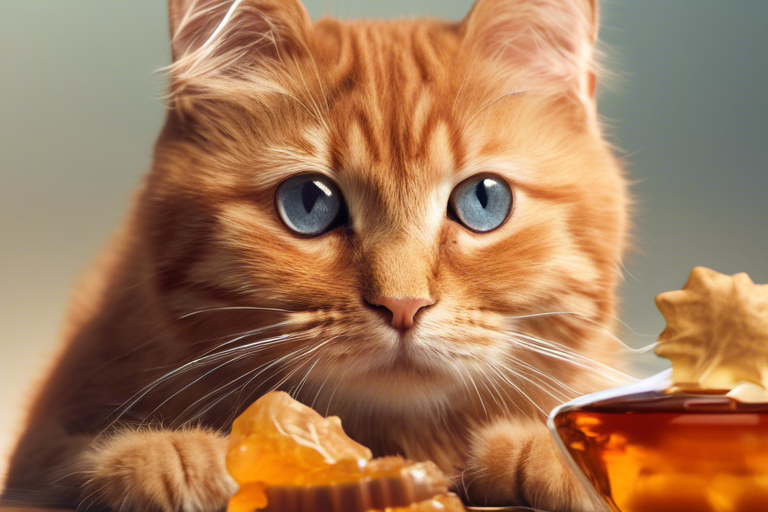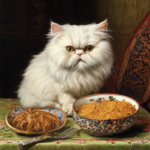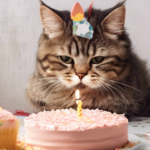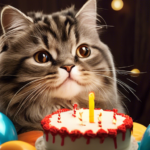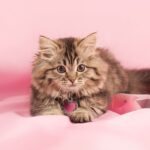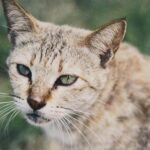As a cat owner, you may have experienced a peculiar aroma emanating from your feline companion – a scent reminiscent of sweet cat smell like maple syrup. It’s not uncommon for cat parents to notice this distinctive smell and wonder about its cause. In this comprehensive guide, we will explore the various reasons behind why your cat smell like maple syrup. From genetic mutations to underlying medical conditions, we’ll delve into the possible explanations and provide you with practical tips to address the issue. So, let’s embark on this aromatic journey together!
The Maple Syrup Scent: An Unusual Enigma
Cats have a remarkable sense of smell, and they emit a variety of scents, each with its own unique characteristics. Among these scents, the sweet aroma of maple syrup can be perplexing. Understanding why your cat exudes this particular fragrance is essential to deciphering the underlying causes. The scent itself is often described as sugary and syrupy, reminiscent of the beloved breakfast condiment. However, the root cause of this scent can vary, and it’s crucial to unravel the mystery for the well-being of your furry friend.
Unraveling the Science Behind the Maple Syrup Scent
To comprehend why your cat may smell like maple syrup, it’s essential to delve into the scientific explanations behind this phenomenon. The scent is typically the result of certain organic compounds accumulating in your cat’s body. These compounds are metabolized by enzymes, eventually being excreted through various channels such as urine, breath, and even the skin, resulting in the sweet aroma.
Interestingly, the same compounds responsible for the maple syrup scent in cats are also found in fenugreek, a spice commonly used in Indian cuisine. This spice contains high levels of amino acids, namely valine, isoleucine, and leucine, which contribute to the distinctive sweet smell emanating from your feline companion.
Common Culprits: Reasons for the Maple Syrup Odor
Several factors can contribute to your cat emitting a maple syrup-like scent. One common cause is a change in diet. If your cat’s food contains a high level of amino acids, such as valine, isoleucine, and leucine, this can create a maple syrup-like odor.
Another potential reason for the scent is a condition known as ketoacidosis. This occurs when your cat’s body breaks down stored fat for energy, leading to a buildup of ketones in the bloodstream. The presence of ketones can result in the characteristic maple syrup-like smell.
Certain genetic metabolic disorders, such as Maple Syrup Urine Disease (MSUD), can also cause a sweet-smelling odor in cats. These disorders impair the body’s ability to metabolize specific amino acids, leading to the accumulation of compounds that contribute to the scent.
Recognizing When to Be Concerned
While the maple syrup scent in cats may not always be cause for concern, it’s crucial to monitor your feline companion for any accompanying symptoms that may indicate an underlying health condition. If your cat exhibits lethargy, loss of appetite, vomiting, or diarrhea, the scent could be a sign of a more serious issue. In such cases, it’s essential to seek veterinary care immediately.
It’s worth noting that some cat breeds, such as Siamese and Burmese cats, may have a higher concentration of the amino acids responsible for the sweet smell. Therefore, they may have a more pronounced maple syrup scent compared to other breeds.
Potential Health Issues Associated with the Maple Syrup Scent
The maple syrup scent in cats can serve as a warning sign of an underlying health concern. Understanding the potential health issues associated with this scent can help you take appropriate action and ensure the well-being of your feline companion.
Diabetes in Cats
Cats with diabetes may emit a sweet odor resembling maple syrup. This scent arises from their body’s inability to properly metabolize glucose, leading to increased levels of glucose in the bloodstream. Diabetes is a serious condition that requires ongoing management, so it’s crucial to consult with your veterinarian for proper diagnosis and treatment. Keep an eye out for symptoms such as increased thirst, frequent urination, weight loss, and lethargy.
Urinary Tract Infections
A urinary tract infection (UTI) in cats can cause an unusual smell, including a maple syrup scent. UTIs typically cause discomfort during urination and can lead to more severe health issues if left untreated. Other symptoms of a UTI in cats include frequent urination, straining to urinate, and blood in the urine. If you suspect your cat may have a UTI, it’s important to consult with your veterinarian for proper diagnosis and treatment.
Metabolic Disorders
Maple syrup smelling urine in cats can also be indicative of metabolic disorders. These disorders can disrupt the way your cat’s body processes nutrients, leading to a range of health concerns. Hyperthyroidism, liver disease, and kidney disease are examples of common metabolic disorders in cats. Symptoms of these disorders may include weight loss, vomiting, diarrhea, and lethargy. If you suspect your cat may have a metabolic disorder, it’s crucial to consult with your veterinarian for proper diagnosis and treatment.

Image Source: FreeImages
Environmental Factors Contributing to the Maple Syrup Smell
Apart from health concerns, environmental factors can also contribute to a sweet scent in your cat. Understanding these factors can help you identify the root cause of the smell and take appropriate measures to eliminate it.
Diet and Nutrition
A cat’s diet plays a significant role in their overall scent. Feeding your cat a well-balanced diet that meets their nutritional needs is crucial for maintaining their health and minimizing any unusual odors. Certain foods, such as fish or liver, can leave a strong odor in your cat’s breath or coat, which can contribute to the sweet smell you’re noticing. However, it’s essential to remember that cats are obligate carnivores and require a diet primarily composed of animal proteins and fats.
Grooming Products and Practices
Some grooming products, such as shampoos or perfumes, can contribute to a sweet aroma in your cat. Cats can be sensitive to specific ingredients, so it’s important to choose products specifically formulated for felines and free of harsh chemicals and fragrances. Regular grooming practices, such as brushing your cat’s coat and maintaining good hygiene, can also help prevent any unpleasant smells from lingering.
Exposure to Substances
Cats are curious creatures and may come into contact with various substances that can affect their scent. Mold in the home, for example, can produce an odor similar to maple syrup. Additionally, household cleaners or pesticides used in the home may transfer their scent to your feline companion. To reduce your cat’s exposure to these substances, ensure your home is clean, well-ventilated, and use pet-safe cleaning products whenever possible.
It’s important to note that certain cats may be more sensitive to environmental factors than others. If you’ve tried various solutions to eliminate the maple syrup smell without success, it may be worth consulting with your veterinarian or a feline behaviorist to identify any underlying issues and develop a personalized plan of action.
Addressing the Maple Syrup Scent in Your Cat
If your cat emits a maple syrup-like scent, there are steps you can take to address the issue and ensure your furry friend smells fresh and clean.
Consult with a Veterinarian
If the maple syrup scent persists or if you notice any accompanying symptoms, it’s crucial to schedule a visit to the veterinarian. A professional examination and diagnostic tests can help determine the underlying cause of the scent and guide appropriate treatment. Consulting with a veterinarian is always the best course of action when it comes to your cat’s health.
Adjusting Your Cat’s Diet
If a change in diet is suspected as the culprit, consider altering your cat’s food to one with fewer amino acids. High levels of certain amino acids can contribute to the maple syrup-like odor. Consult with your veterinarian to select a balanced diet tailored to your cat’s specific needs. They may recommend a prescription diet or suggest adding supplements to your cat’s current food.
Remember to introduce dietary changes gradually to avoid digestive upset, and always follow your veterinarian’s recommendations.
Proper Grooming Techniques
Regular grooming is essential for maintaining your cat’s cleanliness and reducing any unwanted odors. Brush your cat’s coat regularly to remove dirt, debris, and loose hair. This not only keeps their fur looking sleek but also helps distribute natural oils that contribute to a healthy coat. For long-haired cats, consider trimming their fur to prevent matting and odor buildup.
In addition to brushing, pay attention to your cat’s oral hygiene. Dental issues can cause bad breath, which can contribute to an unpleasant overall smell. Consult with your veterinarian for guidance on proper dental care for your cat.
Maintain a Clean Environment
Keeping your cat’s living space clean is vital for minimizing any lingering odors. Clean their litter box regularly, as the accumulation of urine and fecal matter can contribute to a strong smell. Choose a litter that effectively controls odor and provides a comfortable experience for your cat.
Beyond the litter box, clean your home regularly, paying attention to areas where your cat spends time. Vacuuming floors, washing bedding, and removing any sources of odor can help create a fresh and pleasant environment for both you and your cat.
FAQs: Frequently Asked Questions
Q: Does maple syrup attract cats?
A: No, cats are not particularly attracted to the smell of maple syrup. In fact, the sweet scent might not be appealing to them. Stick to providing your cat with appropriate and healthy treats instead.
Q: Can cats be allergic to maple syrup?
A: Yes, some cats can be allergic to maple syrup. If you notice any adverse reactions after your cat consumes maple syrup or any food containing it, consult with your veterinarian for guidance.
Q: Is maple syrup safe for cats?
A: Maple syrup is not recommended for cats. It contains high levels of sugar, which can be harmful to their health. Stick to treats specifically formulated for feline consumption and consult with your veterinarian regarding suitable dietary options.
Conclusion: Unraveling the Maple Syrup Mystery
The maple syrup scent in cats is a fascinating phenomenon that can be attributed to various causes, ranging from genetic mutations to underlying health conditions. Understanding the potential reasons behind this scent is essential for maintaining your cat’s well-being and ensuring a pleasant living environment for both of you.
If you notice your cat emitting a maple syrup-like odor, it’s crucial to monitor their behavior and seek veterinary attention if any accompanying symptoms or concerns arise. With proper diagnosis and treatment, many health issues can be effectively managed, allowing your feline companion to live a happy and healthy life.
Remember to maintain a clean environment, provide a balanced diet, and practice regular grooming to keep your cat smelling fresh and delightful. By being attentive to your cat’s needs and seeking professional guidance when necessary, you can unravel the mystery of the maple syrup scent and provide the best care for your beloved feline friend.
Disclaimer: The information in this article is not intended to be a substitute for professional veterinary advice. Always consult with your veterinarian for proper diagnosis and treatment of your cat’s specific condition.
